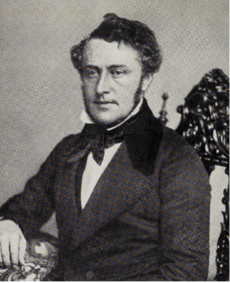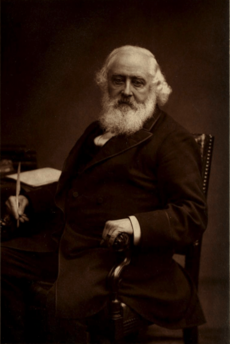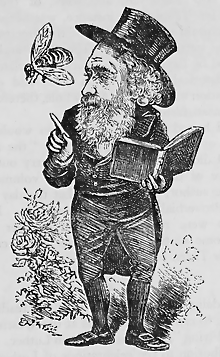Martin Farquhar Tupper facts for kids
Quick facts for kids
Martin Farquahar Tupper
|
|
|---|---|
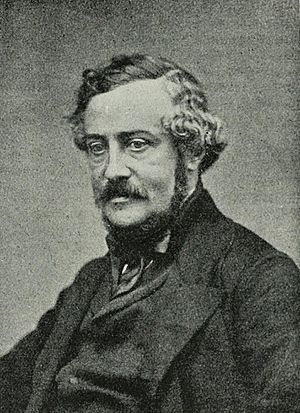 |
|
| Born | 17 July 1810 20 Devonshire Place, London, England |
| Died | 29 November 1889 (aged 79) Underhill, 13 Cintra Park, Upper Norwood, London, England |
| Occupation |
|
| Alma mater | Christ Church, Oxford (BA, MA, DCL) |
| Period | 1832–1886 |
| Genre | Victorian literature |
| Notable works | Proverbial Philosophy |
| Spouse |
Isabella Devis
(m. 1835; died 1885) |
| Children | 8 |
| Relatives | Martin Tupper (father) |
Martin Farquhar Tupper (born July 17, 1810 – died November 29, 1889) was an English poet and writer. He was very popular in his time, especially for his poetry collection Proverbial Philosophy. This book was a huge bestseller in the United Kingdom and North America for many years. He was also a Fellow of the Royal Society (FRS), which is a special honor for people who have made important discoveries in science.
Tupper became famous quite early in his life in Victorian Britain. His book Proverbial Philosophy became even more popular with a second part published in 1842. Its fame quickly spread to the United States and Canada. Tupper made the most of this success by releasing many different versions of his book. He also went on tours in his home country and in North America. He was even one of Queen Victoria's favorite poets. At one point, he was seriously considered for the important job of Poet Laureate of the United Kingdom. However, Proverbial Philosophy eventually became less popular. Its earlier fame made it and its author a target for jokes and parodies.
Even though Tupper wrote a lot and tried hard to promote his work, none of his other books became as successful as Proverbial Philosophy. Towards the end of his life, he was not as well-known. Still, the unique style of Proverbial Philosophy (which Tupper called "rhythmics" instead of poetry) influenced the American poet Walt Whitman. Whitman was also trying out a new style called free verse. Today, Tupper's works are mostly forgotten. By 2002, they had not been printed for over a hundred years.
Contents
Early Life and Education
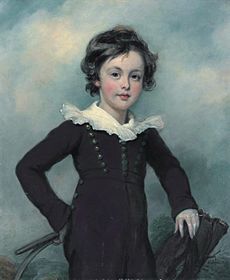
Martin Farquhar Tupper was born on July 17, 1810, in London, England. He was the oldest child of Dr. Martin Tupper, a respected doctor from a family in Guernsey. His mother was Ellin Devis Marris.
Martin F. Tupper went to Eagle House School and Charterhouse School. Later, he studied at Christ Church, Oxford University. He earned his first degree there in 1832. Many of his classmates at Oxford became famous. These included future politicians like William Ewart Gladstone and writers like Henry Liddell. Tupper remained good friends with Gladstone for most of his life.
From a young age, Tupper had a severe stammer. This made it difficult for him to become a church minister or a politician. After getting another degree, he studied law. He became a lawyer in 1835 but never actually worked as one.
On November 26, 1835, Tupper married his cousin, Isabella Devis. He had proposed to her seven years earlier, before going to university. His father supported them financially. While living near Regent's Park, Tupper met Henry Stebbing, a minister and author. Stebbing encouraged Tupper's writing, which led to the publication of Proverbial Philosophy.
A Look at His Career
Early Writings
Tupper started his writing career while at Oxford. His first important book was a collection of 75 short poems called Sacra Poesis (1832). In the same year, he wrote a long poem called "A Voice from the Cloister." This poem was published anonymously in 1835.
In 1838, Tupper wrote a continuation of Samuel Taylor Coleridge's famous poem Christabel. He called his version Geraldine. He published it with other poems in a collection that year. Some critics did not like Geraldine because it was a continuation of an earlier version of Coleridge's poem. However, his other poems in the collection were received more positively.
Proverbial Philosophy and Its Success
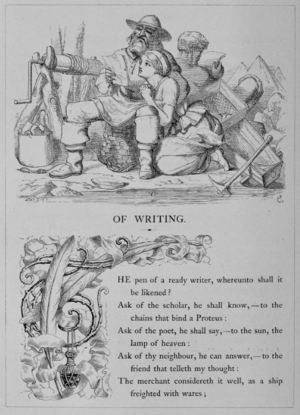
Tupper's most famous work, Proverbial Philosophy, began in 1828. He was engaged to Isabella and wanted to write his thoughts on marriage for her. He wrote them in a style similar to Solomon's proverbs. Isabella showed them to a friend, who suggested publishing them. However, Tupper decided not to at that time.
In 1837, encouraged by Henry Stebbing, Tupper started to revise and expand these writings into a book. He worked on it for 10 weeks. The book contains thoughts and ideas about morality, religion, and human life. Examples include "Of Humility," "Of Prayer," and "Of Love." Tupper preferred to call these pieces "rhythmics" rather than poetry.
The first official version of the book was published on January 24, 1838. It was called Proverbial Philosophy: A Book of Thoughts and Arguments, originally treated, by Martin Farquhar Tupper, Esq., M.A. It had some success in Britain. A second edition was made, and Tupper added more material. A third edition did not sell well. The unsold copies were sent to America, where they were also not popular.
Despite this, Tupper was inspired to write a second part of Proverbial Philosophy in 1841. This new series was published on October 5, 1842. It was immediately popular. The two parts were soon combined into one collection, still called Proverbial Philosophy. This combined version became a huge success for many decades.
The book was seen as a comforting guide for life. It offered moral lessons and advice. Copies were given as gifts for birthdays, anniversaries, and weddings. By 1866, over 200,000 copies had been sold in the United Kingdom. It was also translated into several languages, including German and French.
Tupper wrote a third and fourth part in 1867 and 1869. However, by this time, his work was no longer as popular. These later parts did not sell well. It is estimated that between 250,000 and 500,000 copies were sold in England during his lifetime. In the United States, over 1.5 million copies were sold. Because there were no international copyright laws, Tupper made almost no money from the huge sales in America. However, he did become very famous there.
Becoming Poet Laureate?
When the poet William Wordsworth died in 1850, the position of Poet Laureate became open. This is a special poet who writes poems for national events. Tupper let his influential friends, like William Gladstone, know he was interested. He continued to write poems for public events to show his skills. He wrote about the deaths of important figures and for the Great Exhibition. He even published his "Hymn to the Exhibition" in over sixty languages. Many people, both in Britain and America, supported him for the role. However, Alfred, Lord Tennyson was chosen instead.
First American Tour
Even though he made little money from his books in America, Tupper knew he was very popular there. After overcoming his stammer at age 35, he went on a very successful reading tour. He left Liverpool on March 2, 1851, and arrived in New York City two weeks later. American newspapers announced his arrival. In New York, he met many famous writers like Washington Irving. People generally welcomed him warmly. However, some critics found his habit of quoting his own poetry a bit much.
His popularity in the US was clear. One publisher even put him alongside Solomon and William Shakespeare in a book! The highlight of his tour was a dinner at the White House on May 8 with President Millard Fillmore. President Fillmore was a fan of Tupper's poetry. Tupper wrote about meeting important people like Daniel Webster there.
After visiting other cities, Tupper returned to New York. He met the famous singer Jenny Lind, who was also an admirer of his work. He left for Liverpool on May 24, 1851. Many admirers saw him off, and New York newspapers wrote sad farewells.
Middle Years and Challenges
By 1851, Tupper had eight children. He had moved his large family into Albury House in Albury, Surrey about ten years earlier. However, he faced financial difficulties in the mid-1850s. His wife Isabella became ill. He asked William Gladstone, who was then in charge of the country's money, for help, but he did not get it. His oldest son faced many challenges, and Tupper had to help him. These financial problems were made worse by some bad investments. Tupper kept publishing poetry and new editions of Proverbial Philosophy to earn money. He even had to rent out Albury House from 1867 to get more income.
Tupper was already a favorite poet of Queen Victoria. In June 1857, he wrote poems for her daughter, Victoria, Princess Royal, who was getting married. He was then invited to Buckingham Palace to meet the Queen and Prince Albert. He presented special copies of Proverbial Philosophy to the young couple. This meeting was very unusual for a private person. Tupper's work was well-known to the Royal Family.
Tupper continued to write, but none of his new works became as popular as Proverbial Philosophy. By the mid-1860s, younger writers started to make fun of him and his work. This was because people's tastes were changing.
Later Tours
Tupper decided to focus on giving readings of his works. He started touring south-west England in April 1873. These events were somewhat popular. Many people came just to see if someone as famous as Martin Tupper really existed. His most popular readings were from Proverbial Philosophy, especially "Love" and "Marriage." He also read poems like "Never Give Up." Later that year, he toured Scotland and was well-received.
After his success in Scotland, Tupper decided to go on a second American tour. He arrived in October 1876 and stayed in New York. This tour also involved many public readings. While his popularity in America had also gone down, it was not as much as in Britain. He gave a reading to his largest audience ever, between five and six thousand people, at a church. However, he often did not attract large crowds on his own. This second tour was not as successful as his first. Still, he made some money from it. He was even invited to the inauguration of President Rutherford B. Hayes.
Later Life and Death
By the time he returned from his second American tour in 1877, Tupper was not well-known in Britain. He tried to publish a complete collection of his works, but 26 publishers said no. He was always short of money. In 1880, he had to mortgage his home, Albury House, to the Duke of Northumberland. He and his family moved to a smaller rented house in Upper Norwood.
Tupper made a final attempt to print Proverbial Philosophy in 1881, but it did not sell. He continued to write articles and plays. He published Dramatic Pieces in 1882. He also gave occasional lectures and readings. Around this time, he and Gladstone, his childhood friend, had a disagreement over Gladstone's political views. Gladstone also stopped supporting him financially.
In late 1885, Tupper started writing his autobiography, My Life as an Author, which was published in May 1886. His wife Isabella died in December 1885 while he was writing it. He included a tribute to her in the book. The book received good reviews but did not get a second edition.
Tupper's last published work was a booklet called "Jubilate!". It contained new poems for Queen Victoria's Golden Jubilee. It also included a work he had written for her coronation fifty years earlier.
In November 1886, Tupper became ill and lost the ability to read and write. He remained unwell for his last three years. His children cared for him. He never knew that Albury House had been lost to the Duke of Northumberland during this time. Martin Farquhar Tupper died on November 29, 1889. He was buried in Albury churchyard with his wife and son. His gravestone reads, "He being dead yet speaketh."
His Personal Beliefs
Religion
Tupper was a very strong Protestant throughout his life. He believed in the "Evangelical" type of Protestantism. He felt that his beliefs often caused disagreements with others, especially those who had different views within the church.
His religion was a big part of his writing. Proverbial Philosophy was created with a strong moral and religious message. Later in life, he wrote "extreme Protestant ballads" for a church newspaper. He also supported the Student Volunteer Movement, which encouraged missionary work around the world.
Views on Society and Empire
Tupper was involved in creating the Volunteer Force. This movement helped strengthen the British army. He wrote patriotic poems supporting British troops in the Crimean War. He also wrote about the Indian Rebellion of 1857. His poems often captured the public's feelings about important events.
Tupper was interested in the history of the Anglo-Saxons. He helped organize an event to celebrate the 1000th birthday of Alfred the Great. He also wrote for a magazine focused on friendship between English-speaking peoples. However, his views on different groups of people were influenced by the ideas of his time. He believed that people could be divided into "races" with certain shared traits. This idea is now seen as outdated and harmful.
Tupper was a strong supporter of abolitionism, which meant ending slavery. While studying at Oxford, he refused to eat sugar to protest the slave trade. In 1848, he wrote a national anthem for Liberia, a country founded by freed slaves. He also supported Liberia in his letters to important leaders. He even welcomed Liberian presidents into his home. He created a special prize to encourage writing by formerly enslaved people.
However, regarding the American Civil War, his views were complex. While he wrote to President Lincoln hoping for the end of slavery, his later writings showed some sympathy for the Southern states. In his autobiography, he wrote about visiting a friend who had owned slaves. He described the friend's sadness about the changes after slavery ended.
Legacy and Influence
Tupper was very confident about his place in English literature. He believed his work would live on forever.
Proverbial Philosophy Over Time
After being very popular for about twenty years, Proverbial Philosophy started to lose favor in Britain. This happened as people's tastes and social attitudes changed. In 1858, a magazine called National Review published a strong criticism of his poetry. They called it "superficial and conceited twaddle."
The main reason the book did not last was that its style and ideas were very specific to the early-to-mid Victorian period. As society changed and new scientific ideas emerged, Tupper's views seemed old-fashioned. He was seen as a reminder of a past era. Some people said that children who had received his book as gifts were tired of it. Because it was so tied to its own time, the book never became popular again.
Since Proverbial Philosophy was published when Tupper was young, and he lived a long life, he became an easy target for jokes. By the 1870s, humor magazines like Punch often made fun of him. They would write fake announcements or testimonials about his work. For example, one joke said that dreaming you wrote all of Tupper's works was lucky because you would wake up and find you hadn't.
After the jokes faded, Tupper's work was largely forgotten. As of 2002, none of his books had been printed since 1881. However, digital versions can now be found online.
Influence on Walt Whitman
The famous American poet Walt Whitman was a big fan of Tupper when he was an editor for the Brooklyn Eagle newspaper (1846–1848). Whitman praised Tupper's work, saying he "turns up thoughts as with a plough." People at the time noticed similarities between Proverbial Philosophy and Whitman's own writing. It seems likely that Tupper's style influenced Whitman's book Leaves of Grass. Both poets were very determined to become popular.
However, in later years, Whitman started to distance himself from Tupper. Tupper had become unfashionable, and Whitman wanted to create a unique American style of poetry. He felt that Tupper saw America as just a literary part of England.
In Other Literature
W. S. Gilbert, known for his comic operas, mentioned Tupper in his Bab Ballads. In one poem, he makes a joke about Tupper's style. He writes a line that sounds like something from Proverbial Philosophy but is hard to understand.
Tupper was so famous that the 1933 Oxford English Dictionary included the word Tupperian. This word means "of, belonging to, or in the style of Martin F. Tupper's Proverbial Philosophy." It also includes words like Tupperish and Tupperism.
Awards and Recognition
On April 10, 1845, Tupper was chosen as a Fellow of the Royal Society. This was because he wrote Proverbial Philosophy and other works. He was recognized as an important literary figure. He also made contributions to archaeology. He excavated a site called Farley Heath, where he found a Romano-Celtic temple and other ancient objects.
In 1844, he received the Gold Medal for Science and Literature from the King of Prussia. This was a sign of the King's admiration for Proverbial Philosophy.
Selected Works
- Sacra Poesis (1832)
- "A Voice from the Cloister" (1835)
- Geraldine (1838)
- Proverbial Philosophy (1838, 1842, 1867, 1869)
- A Modern Pyramid (1839)
- An Author's Mind (1841)
- The Crock of Gold (1844)
- Heart (1844)
- A Thousand Lines (1844)
- "The Song of Seventy"
- "Never Give Up"
- The Twins (1844)
- Probabilities: An Aid to Faith (1847)
- "A Loving Ballad to Brother Jonathan" (1848)
- "A Prayer for the Land" (1848)
- Hactenus (1848)
- "The Dead"
- A Railway Glance at the County of Surrey (1849)
- Alfred, the Great, King of England: King Alfred's Poems (1850)
- "The Anglo-Saxon Race" (1850)
- Complete Poetical Works (1850)
- Complete Prose Works (1850)
- "Hymn to the Exhibition" (1850)
- Ballads for the Times (1851)
- The Complete Works of Martin F. Tupper (1851)
- "A Hymn for All Nations" (1851)
- "Niagara" (1851)
- "A Dirge for Wellington" (1852)
- "Things to Come: A Prophetic Ode" (1852)
- Half-a-dozen Ballads about Australia (1853)
- War Ballads (1854)
- Lyrics of the Heart and Mind (1855)
- "The Atlantic Telegraph" (1856)
- Paterfamilias's Diary of Everybody's Tour (1856)
- Alfred: A Patriotic Play, in Five Acts (1858)
- Stephen Langton, or, The Last Days of King John (1858)
- The Rides and Reveries of the Late Mr Aesop Smith (1858)
- Rifle Ballads (1859)
- Three Hundred Sonnets (1860)
- Cithara (1863)
- "A Lyric of Congratulation" (1864)
- "Shakspeare: An Ode For His Three-Hundredth Birthday" (1864)
- "Ode to the South" (1871)
- Protestant Ballads (1874)
- Washington: A Drama, in Five Acts (1876)
- Three Five-Act Plays (1882)
- My Life as an Author (1886)
- "Jubilate!" (1886)
 | Laphonza Butler |
 | Daisy Bates |
 | Elizabeth Piper Ensley |


